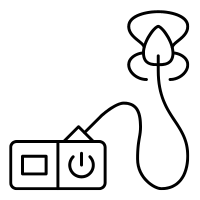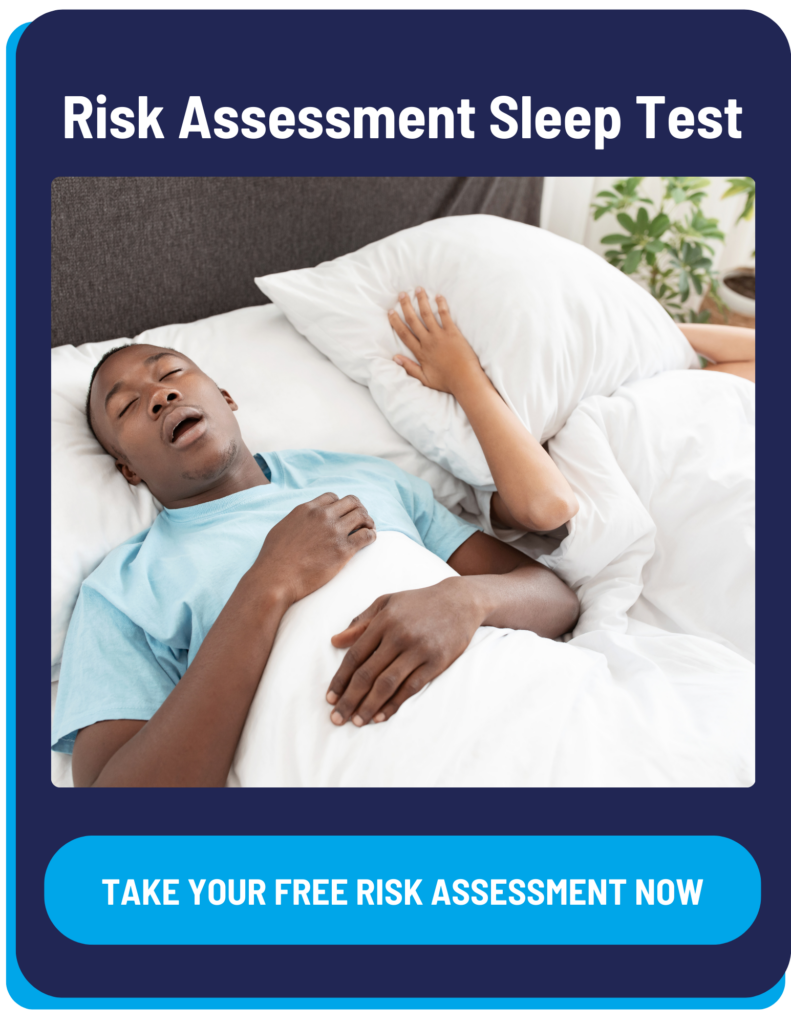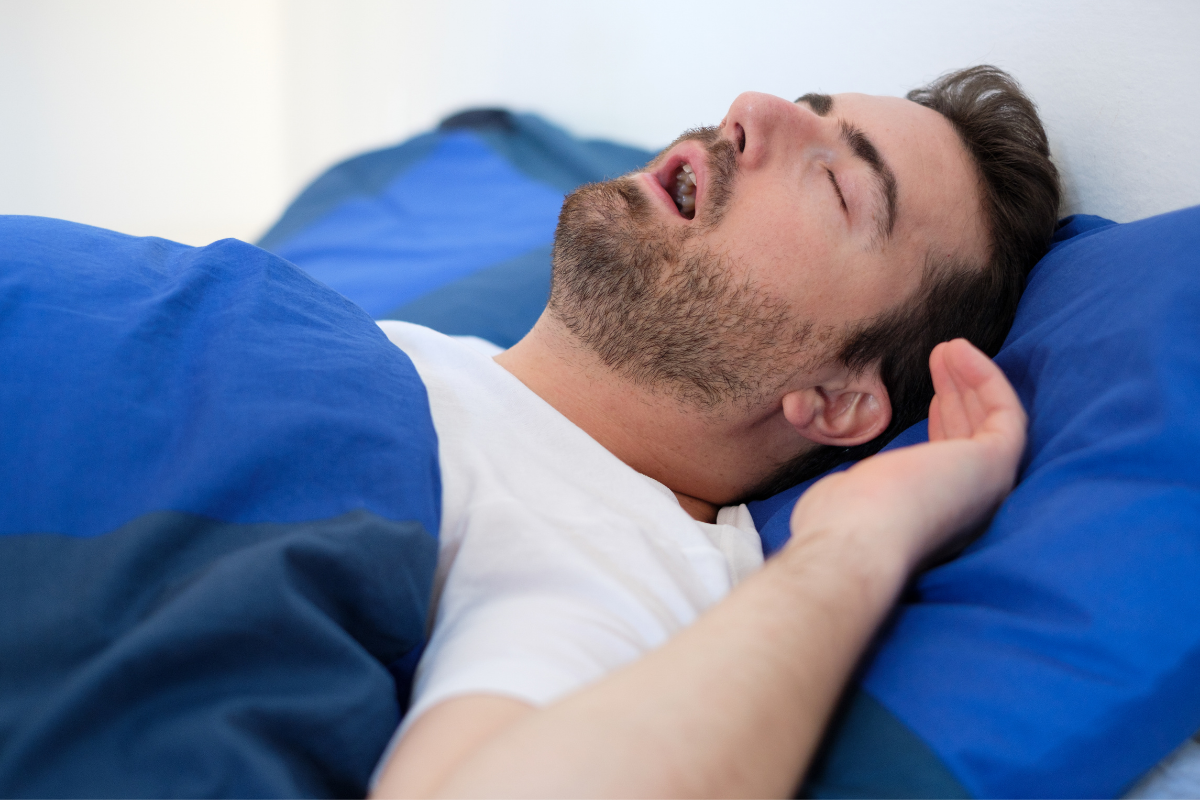Key Takeaways:
- Insomnia and obstructive sleep apnea (OSA) are common conditions that are often associated together because of their similar symptoms, risks, and causes.
- Both insomnia and OSA can share underlying causes like obesity, hormonal imbalances, and chronic endocrine conditions.
- Learn more about the relationship between sleep apnea and insomnia in this blog post.

The two main sleep disorders are sleep apnea and insomnia. Sleep is a critical part of a healthy life, directly tied to mental alertness, improved quality of life, and also long-term physical and mental health. People often consult their physician for a range of medical issues, yet ignore their inability to get a good night’s sleep.
Sleep-related problems affect 50 to 70 million Americans of all ages and socioeconomic classes.1 The two most common sleep disorders are sleep apnea and insomnia. Understanding the similarities and differences between sleep apnea and insomnia disorders will facilitate easier diagnosis and treatment.
Understanding Sleep Apnea
Sleep apnea occurs when the airway periodically closes while you sleep. The disruptive breathing pattern of apneas occurs repeatedly throughout the night, preventing restful sleep. Over time, this sleep deficiency contributes to several health comorbidities. It can be caused by relaxed throat muscles that block the proper airflow from getting into your lungs, excess weight (especially around the neck and throat), and conditions like diabetes, high blood pressure, insomnia, and more.
What are the Symptoms of Sleep Apnea?
Sleep apnea symptoms include:
- Constant drowsiness during the day
- Loud snoring at night
- Gasping for air while you sleep
- Dry mouth or sore throat in the morning
- Morning headaches
- Difficulty concentrating during the day
- Mood changes, such as depression or irritability
- Unexplained elevated blood pressure
What are the Risks of Sleep Apnea?
Left untreated, sleep apnea patients may have an increased risk of high blood pressure, cardiovascular disease, and neurological events such as stroke, and diabetes. Mental health issues such as depression and anxiety may also be the result of chronic sleep loss.
What is Insomnia?
Insomnia is defined as an inability to sleep initially or an inability to experience extended periods of sleep. Since a single night of sleeplessness isn’t the same as insomnia, you might not know whether you have had acute insomnia in the past. Acute insomnia lasts up to three months and is characterized by not getting enough sleep at least three nights a week. It usually happens when you’re under a lot of tension, or when you’ve been through a lot of trauma. Acute insomnia may be caused by a variety of factors, like excitement over an upcoming trip or sorrow over the death of a friend.
If insomnia lasts more than three months, it’s considered permanent. Any amount of sleepless nights can have serious effects over time. Finding out what’s behind your insomnia is one way to get back to healthier sleep.
Insomnia symptoms include:
- Inability to fall asleep
- Wakefulness at night
- Waking up too early
- Fatigue during the day
- Difficulty concentrating during the day
- Not feeling rested after a night’s sleep
- Feelings of irritability
- Increased risk of accidents
What are the Health Risks of Insomnia?
About 30% of American adults have symptoms of insomnia.2 Insomnia can contribute to poor mental health, including a higher risk of depression and anxiety. With chronic insomnia, your daily well-being could be different and can have both short-term (ie, poor performance at school or work) and long-term (ie, high blood pressure and heart disease) health issues.
- Shortened life expectancy
- Increased risk for accidents
- Increased risk for mental health disorders
- Increased risk for medical conditions
What is the Difference Between Sleep Apnea and Insomnia?
Knowing the difference between sleep apnea and insomnia disorders leads to appropriate treatment. Sleep apnea is a physical disorder that stems from a collapsed airway. Insomnia is more of a psychological disorder usually coming from stress, aging, poor sleep habits, or overuse of substances, such as caffeine or alcohol.
Are Insomnia and Sleep Apnea Related?
Although insomnia and sleep apnea are medically distinct sleep conditions, a high proportion of people experience them at the same time. According to studies, a large number of individuals who have one of the disorders (up to 50-60 percent) were later found to have the other disorder as well.
The brain deliberately wakes a person with sleep apnea up to reopen the airway and prevent asphyxiation. Obviously, this can lead to insomnia. The brain recognizes that apneas are life-threatening and tries to suppress them by causing insomnia.
Insomniacs, on the other hand, may have undiagnosed sleep apnea, and may unknowingly wake up several times per night.
There is some controversy over the root of the causal association between the two diseases, but one thing is certain: once you have one illness, you are more likely to either have or worsen the other if it is not treated successfully.
How to Treat Insomnia
If diagnosed with insomnia, doctors may prescribe medications or psychological and behavioral therapy to help improve sleep. Reducing stress, addressing emotional or psychological disturbances, and changing lifestyles are common ways to help insomniacs sleep better.
Benzodiazepines: Benzodiazepines are a common drug issued to treat insomnia.
Nonbenzodiazepines: Nonbenzodiazepines are a common drug used to treat short-term insomnia. These include: szopiclone (Lunesta), zaleplon (Sonata), and zolpidem (Ambien, Edluar, Intermezzo, Zolpimist).
Melatonin receptor agonists: Melatonin receptor agonists are medications that bind to and activate the melatonin receptor, which is the hormone that regulates sleep-wake cycles. This type of medicine is used to treat many conditions, including insomnia, depression, and circadian rhythm sleep-wake disorders.
Orexin receptor antagonists: Orexin receptor antagonists (ORAs) is a treatment option for insomnia by blocking the orexin pathway. Orexin is a neuropeptide that helps maintain arousal and ORAs work by binding to and inhibiting the action of orexin receptors OX₁ and OX₂.
Over-the-counter (OTC) medications: OTC medication is the most helpful for acute or situational insomnia.
Maintain a regular sleep schedule: Keeping a regular sleep schedule will help your body get into a healthy routine of falling asleep at a consistent time each night. Learn the best bedtime routine for adults in this blog post.
Don’t watch TV in bed: It may be difficult to fall asleep if your mind is focused or aroused watching a television show. The blue light that is also emitted from televisions (smartphones, laptops, and tablets, too!) can make it hard to fall asleep. Turn all of your screens off at least 1-2 hours before sleep.
Keep your bedroom comfortable: If you are not comfortable you will not fall asleep. Make sure your bedroom temperature is not too hot or too cold. It is recommended to keep your room slightly cool to help you fall asleep.
Relax!: Relaxing your mind and body is an essential part of overall health and well-being. Make sure you are giving yourself time to unwind and relax at night, in a peaceful and quiet environment, to help you fall asleep and stay asleep.
How to Treat Sleep Apnea

In some instances, insomnia may be directly related to poor sleep from sleep apnea. This is why an accurate diagnosis is so important. It is highly recommended to first screen and test for sleep apnea.
Does CPAP Help With Insomnia?
One of the easiest treatments for sleep apnea is usually CPAP Therapy. CPAP therapy uses a machine that sends pressurized air that ensures that your airway stays open during sleep. As a result of this, insomnia patients who use CPAP machines during sleep also find relief from their insomnia. Other lifestyle modifications that help improve sleep apnea can also help improve or prevent insomnia. These lifestyle modifications include regular exercise, weight reduction, proper diet, quitting smoking, and alcohol consumption.
Getting A Diagnosis for Sleep Apnea
Fortunately, the process to diagnose sleep apnea is now convenient, simple, and fast. And you never have to step into a doctor’s office! At Sleep Care online, we have combined telehealth medicine with a home sleep test in our Complete Care package. Here’s how it works:
- With the Complete Care Package, schedule a 10-minute telehealth visit with a healthcare provider to discuss your symptoms, upcoming sleep study, test results, and treatment options.
- A disposable home sleep apnea test is mailed to your home to be completed at your convenience.
- A physician analyzes the sleep data and provides a prescription if needed.
- Schedule an optional follow-up appointment (additional fee applies).
- We connect you to sleep experts who can offer customized sleep therapy options, assistance in equipment purchase, and initial set-up.
Curious? If you have questions, give us a call at 866-465-4478 or contact us at contact@sleepcareonline.com.
References
- American Sleep Apnea Association. Sleep Health. Accessed January 2020.
- The Good Body. Insomnia Statistics. Accessed January 2020.




